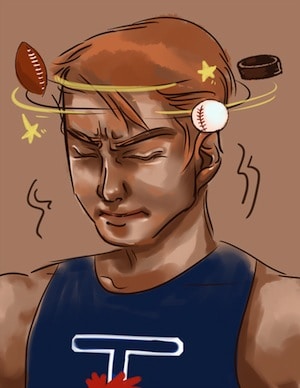After suffering a concussion while playing catcher for the Varsity Blues’ baseball team, Kyle Bowers enrolled with the University of Toronto’s Accessibility Services. He was required to fill out several forms to get accommodation for his classes.
Bowers did not like seeing the word “disability” on his forms; his identity was steeped in the image of a male student-athlete, with all its trappings: the personal fitness level, the hyper-competitiveness, and the social status.
“I wanted to scratch out ‘disability’ on all the forms, and write ‘temporary impairment’,” he said.

NANCY JI/THE VARSITY
The concussion was an unfortunate result of a foul-tip. “Usually, it’s a glancing blow,” Bowers said. The ball strikes at an angle, rather than directly with full force, and deflects off the catcher’s facemask.
However, on September 22, during the second game of a doubleheader, the ball hit Bowers square in the forehead and dropped right in front of him: “In the moment, I was a little disoriented, a little shaky. When you’re a catcher, you get shook real good.”
“It happens a lot,” he added. “But most of the time it’ll knock my helmet off my head, or it will spin my helmet around.”
The team trainer saw what happened and gave Bowers a concussion test on the sideline. He did several word associations and number memorizations with him. “I passed,” Bowers said, using air quotes, “but athletes tend to under report things. I felt terrible the rest of the game.” Bowers’ adrenaline kept him playing — he ended up hitting a double that contributed to an important win.
When the adrenaline wore off, Bowers tried to take a nap on the team bus, but could not fall asleep.
After assuming that a night’s sleep would do the trick, Bowers went to class the next morning, but the headache was not going away. He was concerned that if he confided in a doctor, he wouldn’t be able to play baseball, but the headache kept getting worse. By the afternoon, he broke down and scheduled a doctor’s appointment for the next morning.
Medically, Bowers felt taken care of. But recovering from a concussion goes beyond the quality of the care that he received at U of T’s MacIntosh Clinic.
Bowers was told to sleep in a dark room. He chose his basement where he was hidden from light and his family, friends, and teammates. He couldn’t watch TV, send text messages, or go out on the weekends.
Bowers couldn’t wait to get medically cleared. He wanted to get back onto the diamond with his teammates as soon as possible. In his first two seasons, the Blues had won back-to-back championships and were hoping to add onto the streak.
The first step was to be symptom-free for 24 hours. After that, Bowers could try some light exercise. With doctor’s orders, he started using a stationary bike, but the headaches and the dizziness weren’t ready to go away. He was back to step one: the dark room.
Between the dark room and the doctor’s visits, Bowers was trying to get floating extensions on his schoolwork. His doctor felt the resulting stress contributed to his setback.
His kinesiology professors understood — they were familiar with concussions. As Bowers found, however, other professors were not as accommodating. His notes would say to follow up with his professors in seven days, so his professors would offer a one-week extension. The problem was that Bowers didn’t have a timeline from his doctor for when his symptoms would go away.
After more rest, Bowers managed to get through light exercise without any symptoms, and was cleared for baseball-related activities like light catch and batting practice. Bowers travelled to Wilfred Laurier University and hoped to play at Western University the following week. To do that, he had to remain symptom–free after a team practice.
His teammates were excited to have their catcher back. “My teammates see me, you get the whistles, the cheers… look who’s back!” said Bowers.
The practice went well, his teammates thought he was back to normal, and everyone was excited. But soon after, his symptoms returned, and it was back to the dark room.
Bowers’ season was over — he had reached his nadir. “I think I felt worse than I did before… because I realized I’m not ok.” The doctor told him that he would have to take even more time off from exercise after his latest setback, but Bowers was also given some good news.
Barring being a statistical anomaly, Bowers could be cleared to return next fall. “Concussion symptoms do go away,” he said.
He’s excited to return next year, but disappointed that he lost half of his season to injury. However, Bowers did manage to learn from his experience.
“I see the stigmas now more,” he said. “Now that I understand more, and I understand disabilities of all types, what people go through… It’s almost a carry over of that stigma, the lack of social support, the lack of understanding.”
Bowers now prides himself on his newfound sensitivity on matters of disability. He also feels personal responsibility to help other student-athletes who find themselves needing advice on brain injuries.
He can tell them about the time he wanted to scratch out the word disability.

